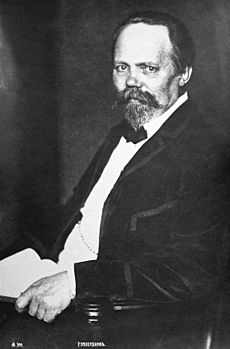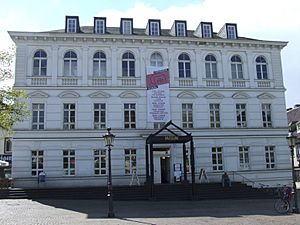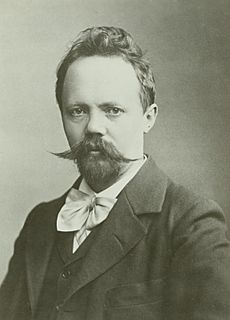Engelbert Humperdinck (composer) facts for kids
Engelbert Humperdinck (born September 1, 1854 – died September 27, 1921) was a famous German composer. He is best known for his wonderful opera Hansel and Gretel, which he wrote in 1893.
Contents
A Young Composer's Journey
Engelbert Humperdinck was born in a town called Siegburg, Germany, in 1854. He started learning piano at a young age and wrote his first music when he was just seven years old! By the time he was 13, he had already tried writing two short operas called singspiele.
His parents weren't sure about him becoming a musician. They wanted him to study architecture instead. But Engelbert loved music too much.
In 1872, he began taking music classes at the Cologne Conservatory. He studied with well-known teachers like Ferdinand Hiller. Later, he won a special scholarship in 1876. This allowed him to study in Munich with other great musicians. In 1879, he won the very first Mendelssohn Award, which was a big honor.
Meeting Richard Wagner
After winning his award, Humperdinck traveled to Italy. There, he met the famous composer Richard Wagner in Naples. Wagner was very impressed with Humperdinck. He invited him to come to Bayreuth, a town famous for Wagner's operas.
From 1880 to 1881, Humperdinck helped Wagner with his opera Parsifal. He also taught music to Wagner's son, Siegfried.
After winning another prize, Humperdinck traveled even more. He visited Italy, France, and Spain. For two years, he taught music at a conservatory in Barcelona. In 1887, he returned to Cologne. He became a professor in Frankfurt in 1890 and also taught harmony at a vocal school. By this time, he had written several pieces for choirs and a fun orchestral work called Humoreske.
The Story of Hansel and Gretel
Humperdinck is most famous for his opera Hänsel und Gretel. He started working on it in Frankfurt in 1890.
The idea for the opera came from a puppet show his nieces were putting on. He first wrote four songs for their show. Then, his sister, Adelheid Wette, helped him. She wrote the story (called a libretto) based on the famous fairy tale by the Brothers Grimm. Humperdinck first wrote it as a singspiel with 16 songs and piano music. By 1891, he began to write the music for a full orchestra.
The opera was first performed in Weimar on December 23, 1893. It was conducted by another famous composer, Richard Strauss. Hansel and Gretel was an instant hit! It was special because it mixed Wagner's musical style with traditional German folk songs.
Hansel and Gretel has always been Humperdinck's most popular work. In 1923, it was the first complete opera ever broadcast on the radio in London. Eight years later, it was the first opera broadcast live from the Metropolitan Opera in New York.
Later Years and Other Works
In 1896, Kaiser Wilhelm II made Humperdinck a Professor. He moved to Boppard. Four years later, he moved to Berlin. There, he became the head of a special school for composers. Some of his students included Andrés Isasi and Kurt Weill.
Humperdinck wrote other operas and stage works too, such as:
- Die sieben Geißlein (The Seven Little Kids), 1895
- Königskinder (King's Children), 1897, 1910
- Dornröschen (Sleeping Beauty), 1902
- Die Heirat wider Willen (The Reluctant Marriage), 1905
- Bübchens Weihnachtstraum (The Christmas Dream), 1906
- Die Marketenderin (The Provisioner), 1914
- Gaudeamus: Szenen aus dem deutschen Studentenleben (Gaudeamus igitur: Scenes from German Student Life), 1919
While writing these pieces, Humperdinck also held many important teaching jobs. He also worked in theater, writing music for plays by Max Reinhardt in Berlin. For example, he wrote music for Shakespeare's The Merchant of Venice in 1905.
Humperdinck was known for following Wagner's style. However, he was the first composer to use a special vocal technique called Sprechgesang. This is a way of singing that is halfway between singing and speaking. He used it in his work Königskinder (1897).
In 1914, Humperdinck wanted to become the director of a music school in Australia. But World War I started, and it became impossible for a German to get that job.
On January 5, 1912, Humperdinck had a severe stroke. He got better, but his left hand was permanently paralyzed. He still kept composing! He finished his work Gaudeamus in 1918 with help from his son, Wolfram.
On September 26, 1921, Humperdinck went to see an opera by Carl Maria von Weber. It was his son Wolfram's first time directing a stage show. Humperdinck had a heart attack during the performance and passed away the next day from another heart attack. The Berlin State Opera performed Hansel and Gretel a few weeks later to honor him. He was buried in a cemetery near Berlin.
His Lasting Mark
Engelbert Humperdinck left a big mark on classical music. Many students learned from him. You can find a list of his students here: this list.
In 1965, a British singer named Arnold Dorsey chose to call himself Engelbert Humperdinck after the composer.
Even an asteroid in space is named after him! The asteroid 9913 Humperdinck, discovered in 1977, carries his name.
See also
 In Spanish: Engelbert Humperdinck para niños
In Spanish: Engelbert Humperdinck para niños
 | Jewel Prestage |
 | Ella Baker |
 | Fannie Lou Hamer |




